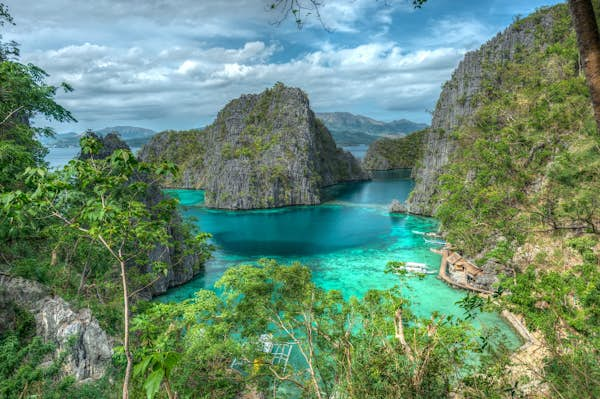The Philippines’ ‘final frontier’ no longer, Palawan is a must for the global traveller, with its heady mix of sublime seascapes, virgin rainforests and world-class resorts. Palawan’s beaches simply have no equal, and with scores of islands to explore, the archipelago offers boundless opportunities for those looking to escape reality for a few days – or months.

Diving and snorkelling
A rich underwater tapestry greets scuba divers who flock to Palawan, which lies at the very heart of the Coral Triangle biodiversity corridor. The highlight is Tubbataha Reefs National Park, a partially sunken atoll in the middle of the Sulu Sea that’s accessible only by live-aboard boat from late March to mid-June. Here hammerheads mingle with giant wrasse and manta rays on a radiant coral shelf. Up north in the Calamian Islands, experienced divers penetrate the haunting husks of some two dozen Japanese shipwrecks sunk by American bombers in Coron Bay in 1944. The Calamians, along with El Nido, have outstanding reef diving. Live-aboard trips between these two tourist hotspots cut through the Linapacan Archipelago, characterised by crystalline waters and lonely beaches.

Island hopping
Top of most visitors’ bucket lists is boarding a trusty Philippine bangka (motorized outrigger) or speed boat and setting off to explore Palawan’s 1780 islands. Paradise takes many forms here: from the James Bond-worthy seascapes of El Nido’s Bacuit Archipelago; to the striking turquoise waters and dazzling coral reefs of the Calamian Islands in the north; to the Maldives-esque sandbars of the up-and-coming Balabac Archipelago in the extreme south of the province. Why not unplug from the world and take a multiday expedition, camping on remote islands under the stars, far removed from other tourists?

Beaches
The best part about Palawan’s glorious beaches? Only a fraction are known to the masses. The rest are yours for the taking. El Nido has a seemingly endless supply of sandy dreamscapes both onshore and offshore in the Bacuit Archipelago. The latter was the muse for Alex Garland’s seminal novel, The Beach. North of El Nido, a rough road leads to amber-toned Nacpan Beach, a 3km sprawl with partial sunset views that somehow remains relatively undeveloped. Heading south along Palawan’s west coast, wind-swept affairs like Long Beach in San Vicente lay exposed to the full force of the Pacific Ocean. Way up north, the Calamian Islands are known for postcard-perfect islets often ringed 360-degrees by blindingly white sand.

Jungle adventures
Close to 50% of Palawan’s old-growth forest cover remains intact, by far the most among Philippine provinces, providing ample opportunity for landlubbers to frolic in the forest. Waterfalls – there are literally thousands – thunder out of mainland Palawan’s jagged peaks into crisp emerald-green pools. Estrella Falls in Southern Palawan has no less than 64 tiers; it takes four days to reach them all. Naturalists can prowl the rainforests in search of giant monitor lizards, monkeys, endemic Palawan bearcats or flying foxes. Birdwatchers migrate from around the globe to spot rare species like the vocal Palawan hornbill or the red-vented (Philippine) cockatoo, while determined trekkers can scale myriad peaks.
Seafood
Palawan’s tourism wagon is firmly hitched to the sea, and so is its diet. In Bacuit Bay, bronzed backpackers on island-hopping trips out of El Nido alight on idyllic beaches to gorge on repasts of prawns, squid, mussels, crab and red snapper (pro tip: pick the boat operator with the best lunch). Calamian boat trips offer a similar culinary experience. In remote fishing communities across Palawan, dinner consists of whatever the locals caught that day, perhaps a dorado (mahi-mahi) or yellowfin tuna for sashimi if you’re lucky. Back in civilisation, Kalui in the provincial capital, Puerto Princesa, does delectable set seafood menus complemented by salads of seaweed and forest-picked fern.

Adrenaline rushes
How extreme can you go? Palawan is an amazing destination for adrenaline junkies. In El Nido, it maxes out with cliff-diving from the karst towers of Bacuit Bay – the Red Bull cliff diving series stopped in El Nido earlier this year. Also in the El Nido area, Sibaltan Beach is an up-and-coming kitesurfing spot while Duli Beach woos surfers; the season for both is November to March. Karst is everywhere, providing rock climbers with opportunities to get vertical – El Nido and Sabang are good choices. The latter is the site of the Subterranean River National Park, the longest navigable underground river in the world. Access is by slow paddle boats that hardly qualify as extreme, but with permission you can don spelunking gear and proceed 3km beyond the tourist zone.

Sea kayaking
Why not skip the standard bangka tours and explore Palawan’s iconic bays by sea kayak? Multi-day expeditions are a logical next step. Several companies on the main Calamian island of Busuanga already offer these. Busuanga is surrounded by little islands that provide shelter and good camping spots. Sea kayakers can spend up to a week paddling around the island, fishing for their food and basking in isolation. More extreme are two-week Busuanga-to-El Nido expeditions that pit person against sea. Paddling has the additional benefit of having limited impact on Palawan’s fragile environment.
Sustainable travel
Palawan has always had a responsible attitude towards its environment. It was one of the first provinces to crack down on litter, noise pollution and single-use plastics. There is plenty at stake, as the province’s pristine rainforests and coastal ecosystems are under grave threat from illegal logging and destructive fishing practices. Against that backdrop, several award-winning resorts are leading the way toward a more sustainable future, blending native design and low-carbon elements like solar panels, composting and edible gardens to create living spaces that will last. Ecotourism will play a role in determining the future of the archipelago. Do your homework and choose responsible tour operators and resorts. The future of Palawan depends on it.
